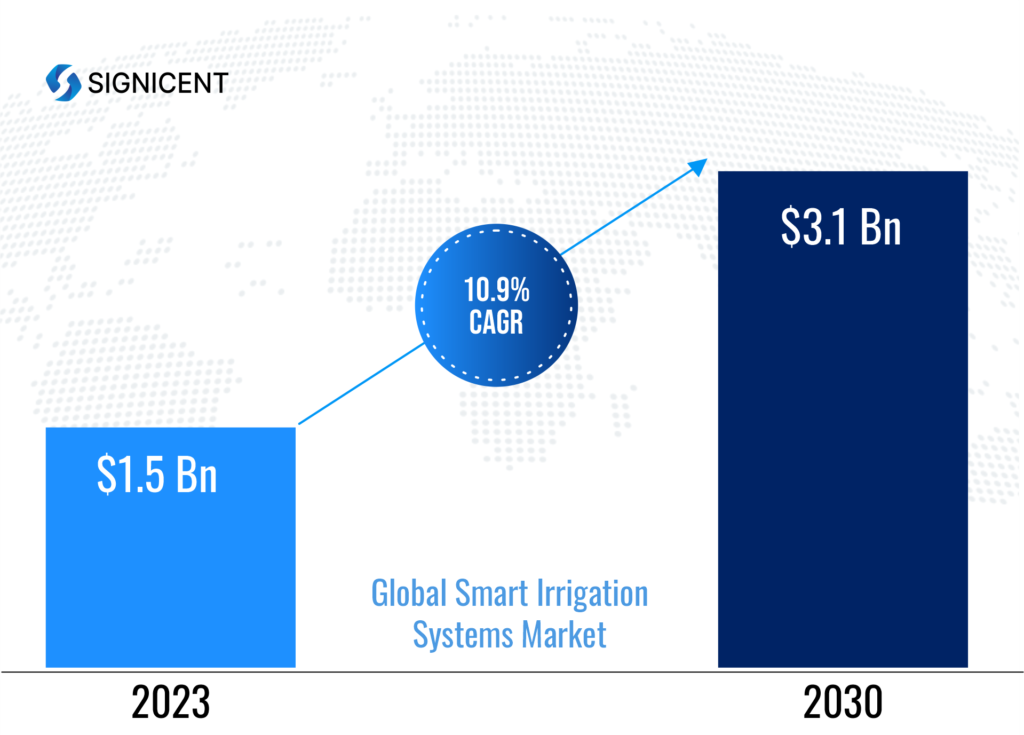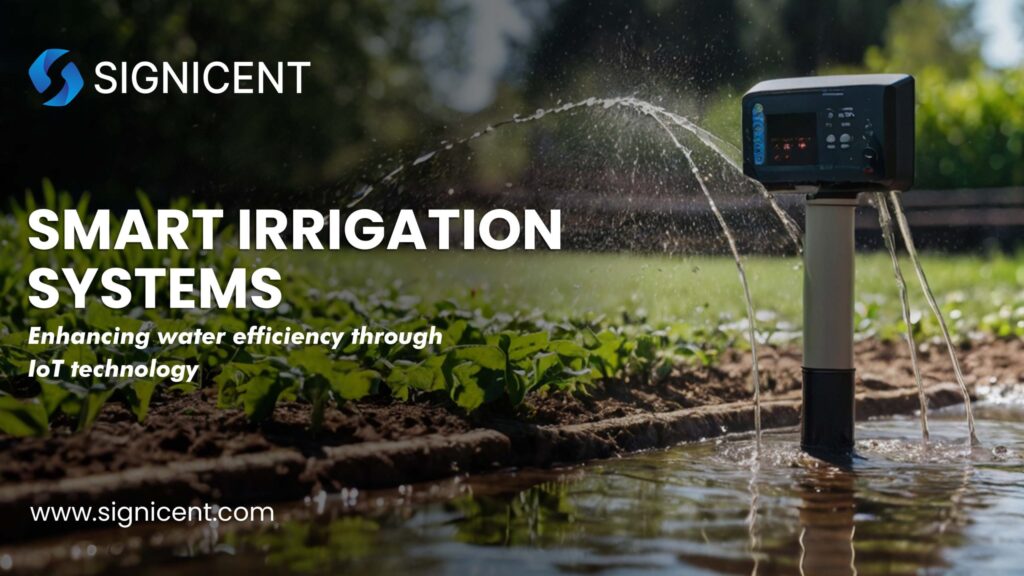As water scarcity intensifies globally, agricultural sectors face mounting challenges in managing water resources effectively. Traditional irrigation methods often lead to significant water waste, exacerbating both environmental and financial concerns. Enter smart power irrigation systems, where Internet of Things (IoT) technology plays a transformative role. These systems leverage real-time data to optimize water use, respond to weather changes, and maintain soil health, ensuring crops receive the precise amount of water needed. By integrating smart sensors, controllers, and data analytics, farmers and landscapers can transition to a more sustainable, cost-effective approach to irrigation. Let’s explore the challenges that smart power irrigation systems address and the innovative solutions driving this revolution in water management.
Signicent offers Patent Landscape Analysis to provide detailed insights into the latest trends in irrigation technology, such as IoT-driven systems. This service helps identify technological advancements, market shifts, and strategic opportunities, enabling businesses to stay ahead in water conservation efforts.
Why is IoT preferred in agriculture for irrigation?
IoT is increasingly preferred in agriculture as it allows for precise, real-time monitoring of irrigation needs. By integrating sensors, weather data, and soil conditions, IoT systems ensure crops receive just the right amount of water, reducing waste and costs. This data-driven approach enhances resource efficiency, boosts crop health, and supports sustainable farming practices.
Use of Solenoid Valves in Irrigation Systems
Solenoid wave valves control the water flow in irrigation systems through electrical signals, enabling remote operation. By integrating IoT technology, these valves can be activated or deactivated remotely via mobile or computer interfaces. This enhances irrigation efficiency by responding to real-time data on soil moisture and weather conditions, allowing for precise water distribution. This reduces manual labor, minimizes water waste, and improves crop health.
Real-Life Challenges Faced by Farmers
- Water Wastage: Traditional irrigation methods often lead to over-watering, evaporative loss, and increased utility costs, impacting budgets and water resources.
- Climate Variability: Unpredictable weather patterns challenge farmers to adjust irrigation timing and amounts, which affects water conservation and crop health.
- Soil Erosion: Over-irrigation washes nutrients out of the soil, degrading soil quality and diminishing crop yields over time.
- Drought Conditions: Increasing global droughts and limited water resources make efficient water use in irrigation critical for sustainable agriculture.
- High Operational Costs: Inefficient irrigation increases water bills, making it costly for farmers and landscapers to manage irrigation without advanced technology.
Through Technology Scouting, Signicent identifies cutting-edge technologies that drive innovation in smart irrigation systems. Our service enables businesses to track emerging trends and evaluate the potential of new technologies, fostering better water management solutions.
New-age Innovations in Smart Irrigation Technology
Smart irrigation technologies are transforming agriculture and landscaping, addressing challenges like water scarcity, over-irrigation, and inconsistent resource distribution. Here’s how these innovations are making an impact:
Climate-Based Controllers (ET Controllers):
These advanced systems dynamically adjust irrigation schedules using real-time weather data and evapotranspiration (ET) calculations. ET measures water loss from evaporation and plant transpiration. By responding to climate variations, ET controllers ensure crops receive the exact water they need, reducing waste and boosting efficiency. For instance, during a dry spell, irrigation is increased, while rainy conditions trigger reductions.
Soil Moisture Sensor Controllers:
Unlike traditional timers, soil moisture sensors initiate irrigation only when soil dryness crosses a predefined threshold. This precise approach is invaluable in drought-prone regions, preventing over-irrigation and maintaining ideal soil conditions for plant growth. Farmers benefit from 4treduced water costs and healthier crops, thanks to the prevention of nutrient loss and waterlogging.
Add-On Sensors are transforming Traditional Systems
Existing irrigation systems can achieve “smart” capabilities without full replacement, thanks to add-on sensors. These compact, affordable devices enhance system performance by addressing specific inefficiencies:
- Soil Moisture Sensors: These monitor soil moisture in real-time, signaling systems to irrigate only when necessary.
- Rain and Freeze Sensors: By pausing irrigation during rainstorms or freezing temperatures, these sensors conserve water and prevent energy waste.
- Wind Sensors: High winds can disrupt even water distribution. Wind sensors detect such conditions, ensuring irrigation resumes under optimal circumstances.
Signicent’s Technology Monitoring service tracks emerging innovations, patents, and competitor activities in smart irrigation. It provides real-time updates, competitive insights, and IP monitoring to help businesses stay ahead and optimize strategies.
How IoT Can Help Irrigation in Farming Lands
The Internet of Things (IoT) brings connectivity and intelligence to irrigation management. It integrates sensors, analytics, and automation, providing actionable insights. IoT-enabled irrigation systems can:
- Monitor Water Levels: Sensors provide accurate readings, ensuring water tanks and reservoirs remain sufficient for operations.
- Optimize Irrigation Schedules: Data on weather, soil, and crop conditions creates efficient, real-time irrigation plans, reducing resource use.
- Remote Control & Alerts: Farmers can remotely adjust systems and receive notifications about anomalies like leaks or excess water usage.
The Power of Innovation
Modern solutions blend hardware and IoT to optimize irrigation efficiency:
- Weather-Based Adjustments: ET controllers analyze current weather patterns, tailoring water distribution for maximum efficiency.
- Automated Soil Monitoring: By preventing overwatering, soil moisture sensors safeguard plant health and preserve soil nutrients.
- Preventive Sensors: Rain, freeze, and wind sensors eliminate waste while ensuring consistent irrigation in varying environmental conditions.
These innovations are reshaping how we think about irrigation, making it smarter, more sustainable, and highly adaptive. By adopting such systems, farmers and landscapers can achieve significant savings, conserve water, and improve crop health—paving the way for a more sustainable future.
Signicent provides comprehensive Technology Landscape Analysis to help businesses understand the current landscape of IoT and sensor technologies used in smart irrigation. This analysis equips companies with actionable insights to refine their strategies and remain competitive in the evolving market.
Main Benefits of Smart Irrigation Systems
- Water Conservation: IoT-based smart systems reduce water waste by responding to weather and soil moisture, conserving valuable water resources.
- Cost Savings: Reduced water usage lowers utility bills, while automation cuts labor costs, creating an affordable, efficient solution.
- Enhanced Crop Health: Targeted irrigation promotes healthy plant growth, resulting in higher yields and reduced dependence on chemical fertilizers.
- Sustainability: By reducing water waste, smart irrigation contributes to a smaller environmental footprint and supports sustainable farming.
- Preventing Disease and Pest Risks: Limits water-related diseases by preventing over-irrigation, fostering a healthier and more resilient crop environment.
Signicent’s Market Assessment and Valuation service provides businesses with a comprehensive evaluation of the smart irrigation market. Through this analysis, we help clients understand market potential, identify high-value segments, and make strategic decisions about entering or expanding within the market.
Market Outlook by Segment
As per Signicent’s Market Research indicates that the global Smart Irrigation Systems Market is projected to achieve significant growth, with estimated values expected to reach the ranges displayed below.

- By Application: Smart irrigation serves diverse areas, from agricultural fields to golf courses, residential, and commercial landscapes, catering to varied needs.
- By End-Users: Targeted users include farmers, landscapers, facility managers, and homeowners, each benefiting from tailored irrigation solutions.
- By Geographic Landscape: North America leads in adoption, while Asia-Pacific gains momentum with agriculture-focused economies embracing IoT technologies.
Leading Key Players in Smart Irrigation

Signicent’s Contribution
Signicent offers extensive Technology Landscape Analysis and Patent Landscape Analysis services, helping companies in the irrigation industry stay competitive with insights into the latest trends and innovations. With expertise in IoT and sustainable technologies, Signicent empowers clients to make informed decisions that maximize water efficiency and reduce costs in the agriculture and landscaping sectors.
Future Development and Conclusion
What does the future hold for smart power irrigation? As water scarcity grows, the demand for innovative irrigation solutions will continue to rise. Smart irrigation systems promise to bring sustainability and efficiency to water management across sectors, from commercial agriculture to residential landscaping. The integration of AI and IoT-driven automation is expected to further enhance precision, enabling even better water management practices and ensuring that the world’s limited water resources are used responsibly. The future of agriculture lies in technologies like these that bring efficiency, cost savings, and sustainability into harmony.
About Signicent LLP
We assist businesses globally in their technology innovations, R&D, new product development, patents, valuation, product commercialization & market research needs.
Services Offered:
- Patent Landscape
- Patent Portfolio Analysis
- Patent Invalidity Search
- Patent Licensing Services
- Freedom to operate (FTO)
- Chemical Structure Search
- Design Patent Search
- Technology Scouting
- Technology Landscape Analysis
- Technology gap analysis
- Technology Intelligence
- Market Research
- Bio Sequence Search
- Manufacturers Search/ Supplier search
Elevate your Innovation and Research with Signicent’s cutting edge approach to assist you with Technology and Market related matters alongside the IP aspect of the analysis.


